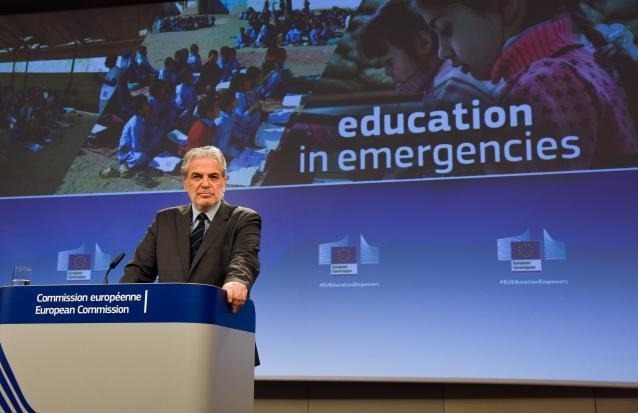The European Commission adopted last Friday a new policy framework that aims to increase humanitarian funding for education of children in emergency situations to 10% of its overall humanitarian aid budget as of 2019. The policy also aims to bring children caught up in humanitarian crises back to learning within 3 months. This is what is required by the UN convention on the rights of the child.
At the press briefing in Brussels (18 May), Christos Stylianides, Commissioner for Humanitarian Aid and Crisis Management, made a passionate plea for children’s right to education. “Our commitment is to leave no children behind. It’s our moral duty and I’ll not rest until we have achieve the goal.”
He admitted that he has been accussed of being obsessed by this issue and explained that this was because education of children has been the most underfunded area in emergencies.
“The EU is now a global leader in bringing children back to school. 8% of our humanitarian aid budget goes to education in emergencies this year, 8 times up from 2015. We aim to reach 10% in 2019,” he said.
Among refugees, just over half of the children of primary school age attend school, while less than a quarter of the equivalent age group are in secondary school and merely 1 per cent in tertiary education. No figures on school attendance by country were presented.
In Lebanon, which hosts about 1.1 million Syrian refugees, the situation has been described as disastrous with children lacking access to education and adults to employment. At a EPC conference in Brussels (16 May), Lina Khatib, Head of the Middle East and North Africa Programme at Chatham House in London, warned against a “ticking time bomb”.
The international aid is supposed to be channeled via humanitarian aid organisations. According to Khatib, most of the foreign funding for refugees received by the Lebanese government is pocketed by local politicians who established organisations that are getting most of the procurement contracts from the government.
“Sadly, the refugee file has come to be seen as a lucrative source of funding in Lebanon.”
To verify the situation a thorough investigation in Lebanon, and possibly also in other countries, would be necessary. Asked by The Brussels Time if he could comment on the allegations, Stylianides assured that EU is applying strict accountability and is monitoring the work of the partners by its internal auditors.
“Until now the situation is going well,” he said and added that he is proud that EU has many education projects in Lebanon.
We have asked the Commission for more information about how the monitoring works and to get access to recent monitoring or audit reports but not received any response until the publication of the article.
M. Apelblat
The Brussels Times

